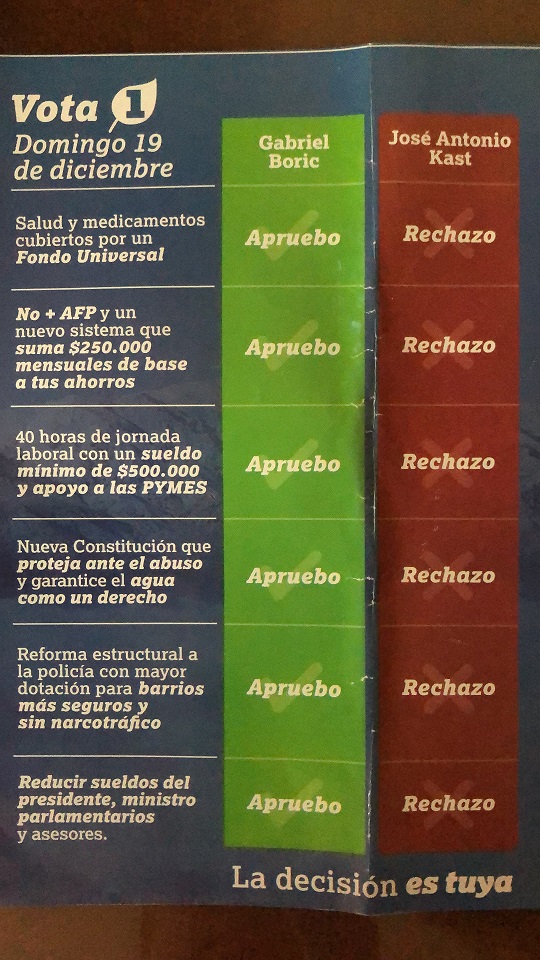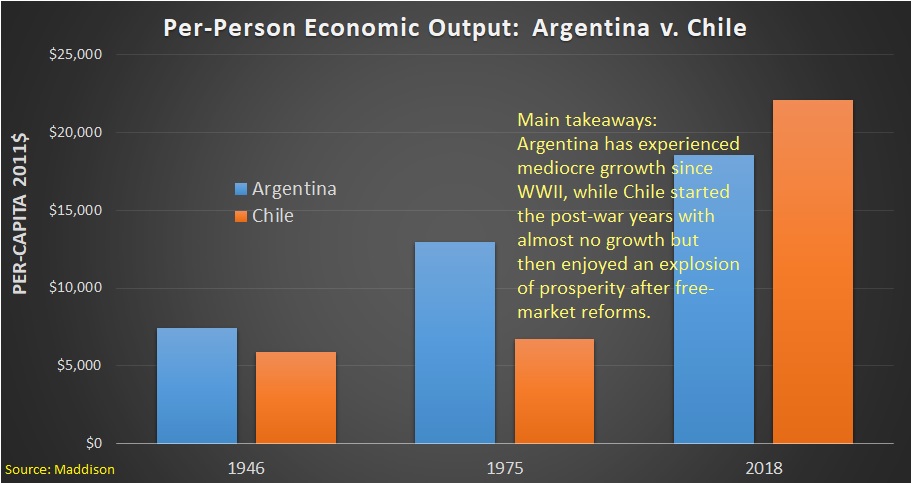I explained a few days ago that Sunday’s presidential runoff in Chile should be viewed as the most important election of 2021.
This is because the left’s candidate, Gabriel Boric, wants to turn Chile into Venezuela, as I mention in this radio interview with Ross Kaminsky.
For some reason, you only hear my voice during this Zoom discussion, which means I don’t even have a face good enough for radio.
But let’s set aside that technical glitch and focus on Mr. Boric’s agenda.
 Here’s a flyer that a campaign worker gave me as I was walking around Santiago yesterday.
Here’s a flyer that a campaign worker gave me as I was walking around Santiago yesterday.
It’s in Spanish, but one of my Chilean friends translated. Here are Boric’s economic proposals.
- Government-run health care (not a good idea).
- Repealing the private pension system (not a good idea).
- 40-hour work week (not a good idea).
- Higher minimum wage (not a good idea).
- Industrial policy (not a good idea).
There was one attractive proposal. He’s proposing to cut the pay of politicians. But that will yield trivial savings if it happens and the odds of it actually happening are laughably small.
Also, he says he wants to fight crime, which is good (in theory).
His worst idea, though, is not on this flyer. If you go to his website, you’ll find this passage in his economic plan (as translated by Google): “The tax reform will collect on the order of 8% of GDP under the regime.”
He is not overly specific on how he will collect so much additional money, but the website mentions higher income taxes, green taxes, and the imposition of a wealth tax.
All of which sounds like a recipe to drive entrepreneurs and investors (and/or their money) out of the country.
To understand the radical nature of his plan, tax revenues in Chile currently grab about 21 percent of the country’s economic output according to the OECD – so Boric is advocating a 38-percent increase.
By comparison, Biden’s tax plan in the U.S. is awful, but he’s “only” proposing a 4-percent increase in the tax burden (about 1 percent of GDP).
P.S. Since Ross and I were comparing Argentina and Chile, here’s a chart I put together using the Maddison database.
P.S. Given that Chile’s free-market reforms have been especially beneficial to poor people (see here, here, here, and here), I wonder if they understand how Boric’s election would threaten their upward mobility.

[…] and Australia continue to perform well, but it is sad that Chile‘s score has dropped over the past few […]
[…] won’t happen with Boric still in power, so we’ll have to see what happens in the next general […]
[…] won’t happen with Boric still in power, so we’ll have to see what happens in the next general […]
[…] I went to Chile last December to write about that nation’s election (see here, here, here, here, and here), I concluded my coverage with a column about the risks of changing that […]
[…] The bottom line is that a wealth tax would be very bad news. It would weaken the United States economy. And it would have an even worse impact on Chile’s economy (particularly when combined with Boric’s other bad policies). […]
[…] The bottom line is that a wealth tax would be very bad news. It would weaken the United States economy. And it would have an even worse impact on Chile’s economy (particularly when combined with Boric’s other bad policies). […]
[…] a Hard-Core Leftist President – Much to my dismay, Chilean voters opted for a hard-core leftist presidentwho wants to dismantle the nation’s very successful private social security system. The […]
[…] Elects a Hard-Core Leftist President – Much to my dismay, Chilean voters opted for a hard-core leftist president who wants to dismantle the nation’s very successful private social security system. The most […]
[…] of bad policy, for sure, but Axel Kaiser warns that the left also wants to replace the country’s […]
[…] warned a few days ago that Gabirel Boric would be bad news if he won Chile’s presidential election. Well, he won, and now we’re going to find out […]
[…] today for a new president and there’s a risk that a Venezuelan-style leftist, Gabriel Boric, will […]
[…] Chileans vote today for a new president and there’s a risk that a Venezuelan-style leftist, Gabriel Boric, will […]
[…] « Chile Election Week, Part II: The Threat of Boricnomics […]
The don’t. Understanding requires intellectual clarity and reasoning. Democratic choices are not intellectual exercises. They are more roulette…a game of chance. Only pain produced by mistakes trigger corrections. Chilean elections are no different than those in the U.S. The pain is rising here. Perhaps enough of it will develop to produce change in 22, and 24. The pain in Chile responds to its own emotional force fields.